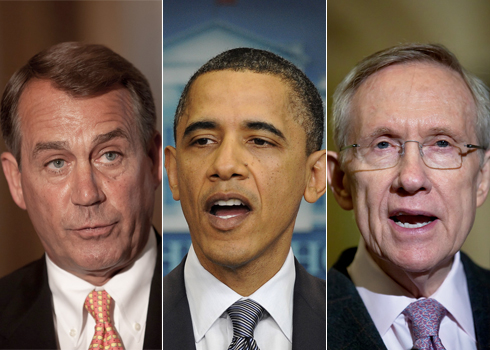They’ve got a deal!
Their negotiations have teetered erratically on the brink of collapse for weeks. But Senate Majority Leader Harry Reid and House Speaker John Boehner have finally shaken hands on a spending bill to fund the government through September and avoid a government shutdown.
“We have agreed to an historic amount of cuts for the remainder of this fiscal year, as well as a short-term bridge that will give us time to avoid a shutdown while we get that agreement through both houses and to the President,” read a joint statement from both leaders. “We will cut $78.5 billion below the President’s 2011 budget proposal, and we have reached an agreement on the policy riders. In the meantime, we will pass a short-term resolution to keep the government running through Thursday. That short-term bridge will cut the first $2 billion of the total savings.”
Despite the violent sturm und drang surrounding these negotiations — including familiar, but tired accusations by Republicans of Democratic infidelity to U.S. troops — the final deal looks uncannily like the framework the two sides have been working with since the middle of March.
It includes cuts to both mandatory and discretionary spending, and does not include a rider that would have defunded Planned Parenthood — the final sticking point in the negotiations. A separate measure to prevent the city of Washington from paying for abortions with its tax revenues survived. Republicans have also been promised votes in the Senate on riders to defund Planned Parenthood and health care implementation. Over $17 billion of the more than $37 billion in cuts from current spending are from mandatory programs.
It’s a mixed bag for both sides politically. Democrats, led by Reid and President Obama, have had to accept cuts to social programs they value ideologically, and that are important to their base. Indeed, the sum of the cuts is higher than Republicans initially thought feasible. But Boehner was walking a tightrope with conservative rank and filers skeptical of any compromise — a rift Democrats stretched to maximum benefit — despite walking away with more fiscal flesh than anybody would have predicted six months ago.
That the government will stay open should come as little solace to Boehner — who to his credit knew the political fallout would harm Republicans. This was a little fight. Puny even. It was the easiest test he’ll face all year, and he barely passed. In just a few weeks, he’ll have to convince the same petulant bloc in his party to support raising the debt limit, or force the country into default. When that’s done, he’ll have to run point on yet another spending fight — to keep the government running next year. In both looming battles, Boehner will demand more spending cuts. But the remaining accounts are much larger, and they pay for programs that have defined Democrats for multiple generations of liberals — popular entitlements like Medicare, Medicaid, and Social Security. The former two in particular are issues where there’s no common ground between the two parties. And yet they’re where all the money is.
This means the legislative politics in America have whipsawed over the course of a year from whether and how to provide universal health care in the United States, to which social programs ought to be cut or annihilated. That the focal point of policy on Capitol Hill is on what should be cut — and not when to cut, or whether cutting is even wise — illustrates just how brief the progressive moment lasted after Obama’s election in 2008. It also represents a colossal failure of government.
To the extent that the United States does have an immediate fiscal problem, it can be traced to three causes — two systemic, one acute, and none Obama’s fault: Bush tax cuts, unfunded Bush administration spending policies (the wars in Iraq and Afghanistan and Medicare Part D) and plummetting tax revenue following the 2008 financial crisis and ensuing recession.
These problems helped Obama get elected. They also required him and Democrats, politically, not to let the public forget where the problems came from. When they failed at that, Republicans took an albatross that rested rightly with them and hung it around the Democrats’ necks.
After historic victories in the November midterms, Republicans were locked into commitments to reduce the deficit and create jobs. What they’ve done instead is target key Democratic spending programs, while pushing to lower taxes on the wealthy, and claim their agenda constitutes a jobs and deficit-reduction program.
Their goals fly aggressively in the face of recommendations from the vast majority of top economists, many of whom support pumping more money into the economy, almost all of whom recommend addressing fiscal imbalances after the recovery is fully locked in. The GOP has cobbled together a list of 500 economists who support their policies, and articulated a hazy thesis for why spending cuts are the proper recipe for a weak economy with high unemployment. But their priorities are more accurately seen as a new round in a fight between two parties, one of which has a base that is older, whiter, wealthier, angrier and shrinking.
The good news is that the cuts themselves are probably modest enough not to truly shock the economy. The better news is that the government avoided a protracted shutdown, which would have been even worse.
The contrast between this GOP majority and the Democratic majority that swept into power in 2006 are stark. The parallels to the last big new GOP majority are obvious. Just as in 1994, when Bill Clinton lost Congress Republicans saw an opportunity and went for it. Then as now, they used maximal negotiating leverage to get their way. Last time they shut the government down. This time they blinked. Next time they may not.






